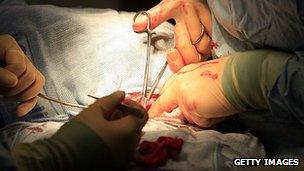Organ trafficking: Dutch to lead international inquiry
- Published

Criminal gangs are involved in the illegal organ trade
A Dutch medical research centre is to lead an international investigation into the trafficking of human organs.
The Erasmus Medical Center in Rotterdam says the project will be funded by the European Commission and will run for three years.
Researchers in Romania, Sweden, Bulgaria and Spain will also take part, as will the EU police agency Europol.
EU prosecutors are investigating organ transplants allegedly carried out illegally in Kosovo in 2008.
In May several suspects were arrested in Israel.
Separately, a Council of Europe report released in December 2010 accused Kosovo's Prime Minister Hashim Thaci - a former leader of the rebel Kosovo Liberation Army (KLA) - of involvement in organ trafficking. He has denied the allegations.
Organs were allegedly taken from prisoners killed by the KLA after the 1999 war against Serb forces.
There have been high-profile cases of illegal organ trafficking in the US and South Africa. Poverty has driven some people to sell one of their kidneys to illegal traders in India, Pakistan and Bangladesh. Rich patients desperate for a kidney transplant are the beneficiaries.
A statement on the Erasmus MC website says the investigation is necessary because "there is increasing evidence of organ tourism, where patients travel abroad for the transplant of an organ that could have been purchased.
"Donors, whether forced or not, often become victims of human trafficking. However, little is known about how often it occurs and how criminal organisations, physicians and others involved operate."
The findings will be discussed at an international conference in 2014. The UN Office on Drugs and Crime is also involved in the project.
- Published25 May 2012
- Published12 January 2011
- Published10 November 2010